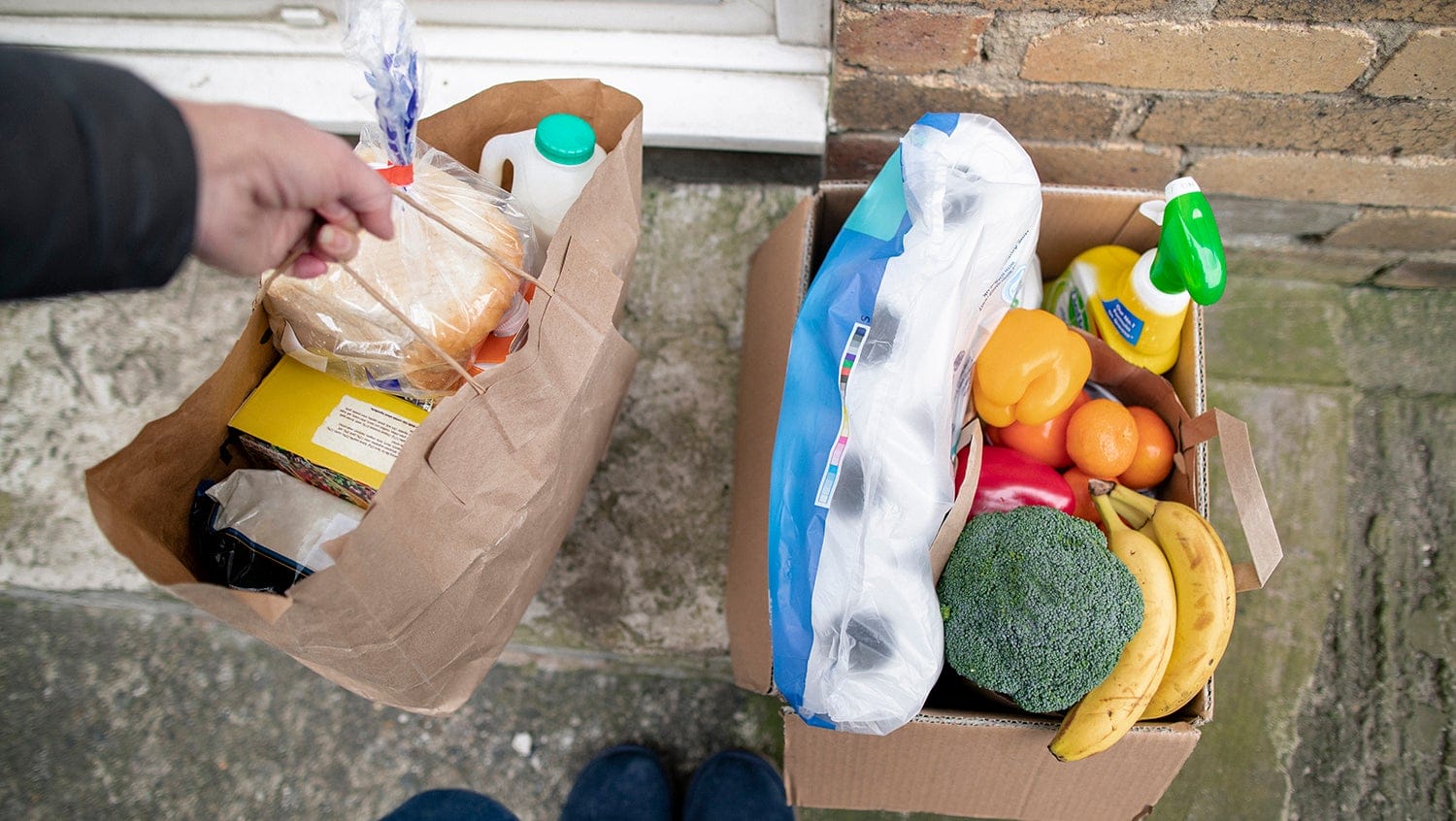Failure to Thrive and Coronavirus: Efforts to Support and Protect Children With Community Resources, Policy, and Advocacy
April 3, 2020
By Dave Wedge

Getty Images
Children's health experts are concerned about the impact of the COVID-19 lockdown on healthy growth and development, especially among vulnerable kids.
Under the best societal conditions, children from families who face barriers to their basic needs may struggle to get the necessary developmental nourishment to keep them healthy and thriving. As the COVID-19 pandemic hits Boston, though, concerns are high that parents’ job losses (especially among the lowest-wage earners) and school closures mean potential food scarcity for at-risk kids. Closures of public schools and daycares due to COVID-19 have eliminated a direct daily source of healthy meals for many children. Nutrition has now become an even bigger concern for kids living in homes of low-wage earners, many of whom work in the service industry and find themselves unemployed due to shutdowns.
Children with growth problems who have been diagnosed with “failure to thrive” (or FTT) by their primary care doctors generally have nutritional deficiencies that lead to growth delays, and many also suffer from shortened attention spans, increased risk of illness, emotional problems, learning disabilities and delays, and impaired motor skills.
Now, kids who were already were an inch off of the growth curve may fall further, experts worry.
“We’re going to have to continue to be vigilant with our families to make sure that they are able to keep up over the long haul with their food resources,” says Megan Sandel, MD, a pediatrician and co-director of the GROW Clinic at Boston Medical Center (BMC).
The GROW Clinic has treated thousands of children diagnosed with FTT, most of whom live in Greater Boston’s poorest neighborhoods, through a comprehensive program that includes specialty medical, nutritional, developmental, and dietary assistance. The Clinic expects to see even more families enter the program as parents and caregivers lose income and struggle to meet grocery bills and other needs that support children’s growth and development. While measures to prevent the spread of coronavirus infection mean that the on-site clinic has temporarily closed, staff members are working harder than ever to help children thrive — through economic and structural supports as well as advocacy and policy work.
Failure to thrive, food, and nourishment during COVID-19
As soon as the crisis started to hit, and it became clear schools and businesses were closing, GROW Clinic staff began outreach. Thanks to generous donors, families have been given emergency gift cards for food. Staff arranged prepaid deliveries through the online shopping app Instacart and helped teach families how to install and use the app on their smartphones. Social workers picked up food from BMC’s onsite food pantry and made home deliveries. Restrictions at the pantry have also been lifted, allowing families to come more often than the normally allotted every two weeks. Sandel leads the GROW clinic with Dr. Soukaina Adolphe and their team are connecting families to other city food resources as well, such as Project Bread and the Greater Boston Food Bank.
While families cope with rebalancing the resources and supports that help them get by, they’re also having to grapple with the challenges of a surge of panic-buying across the board. Daily staples like toilet paper and baby formula have become scarce. Sandel notes reports of people stockpiling and reselling formula at a high markup, making it even less accessible to the families she serves and the babies who could benefit most.
Support the GROW Clinic and its families during COVID-19 »
“Making sure that those specialized formulas are available for our at-risk babies is a huge intervention,” says Sandel. “We’ve been trying to work with durable medical equipment companies to make sure that they have their stocks available and that the deliveries are happening on time. It’s requiring constant monitoring to make sure that those kind of staples aren’t running out.”
Emotional and developmental support
Because of social distance requirements, families are being discouraged from visiting the clinic, but physicians and staffers are using technology to stay connected and keep children on a path to success while they can’t be in school or daycare. Clinic staff are using video conferencing, engaging outreach workers who speak Spanish, Haitian Creole, and Vietnamese when needed, and teaching families how to use online learning apps and websites.
“It’s not unusual for kids to regress in these times. Kids may slip somewhat developmentally,” Sandel says, adding that children thrive in routine — much of which has been upended. “Our goals are to provide safety and consistency for kids.”
Talking openly to kids during a crisis is important as well. Sandel explains that kids exhibit internalizing behaviors, meaning anxiety grows without outward signals that parents can pick up on. She’s been referring families to online resources to encourage healthy communication, such as the tip sheets and cartoons for explaining coronavirus from the early childhood development organization Zero to Three.
“I think the assumption is that kids don’t know what’s going on, but even the youngest of kids know that things are different.”
“I think the assumption is that kids don’t know what’s going on, but even the youngest of kids know that things are different,” Sandel explains. “Being able to provide open conversation for them to ask questions becomes really important.”
Lasting impact with policy and advocacy
Sandel notes that studying the impact of this pandemic is crucial to the delivery of supportive services like the ones she offers at the GROW clinic. Children’s HealthWatch, a national research policy network based at BMC, can fill the gap to bring data from the front lines to policymakers.
While this pandemic is unprecedented in modern history, there is some important data from the 2008 economic collapse that provides guidance on how to help children adapt during times of crisis. For example, Children’s HealthWatch research published in Health Affairs showed increases in food assistance in the 2008 stimulus package was associated with health benefits to children — and Sandel and her team are advocating for similar support in current government aid packages under consideration.
“We’ve been really active in answering calls from congressional staffers and providing evidence-based recommendations to make sure that children aren’t left behind in the stimulus package, including in a lot of the different recommendations related to food and housing and other economic support,” says Sandel.
The team is also planning how to collect data in real-time as this crisis unfolds to help future generations.
“We need to do ongoing data collection generally so that we can capture these trends and policies and then be able to provide the evidence base for why certain policies promote health and why other policies prevent kids from being healthy,” Sandel said. “Because we know that this will have a pretty lasting impact on families.”


